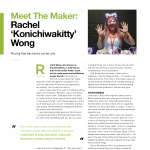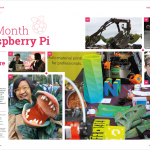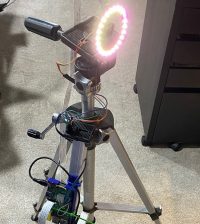- makeITcircular 2024 content launched – Part of Maker Faire Rome 2024Posted 2 weeks ago
- Application For Maker Faire Rome 2024: Deadline June 20thPosted 2 months ago
- Building a 3D Digital Clock with ArduinoPosted 7 months ago
- Creating a controller for Minecraft with realistic body movements using ArduinoPosted 7 months ago
- Snowflake with ArduinoPosted 8 months ago
- Holographic Christmas TreePosted 8 months ago
- Segstick: Build Your Own Self-Balancing Vehicle in Just 2 Days with ArduinoPosted 8 months ago
- ZSWatch: An Open-Source Smartwatch Project Based on the Zephyr Operating SystemPosted 9 months ago
- What is IoT and which devices to usePosted 9 months ago
- Maker Faire Rome Unveils Thrilling “Padel Smash Future” Pavilion for Sports EnthusiastsPosted 10 months ago
Real role models for International Women’s Day 2019
Real role models for International Women’s Day 2019
Maria Quevedo, Managing Director, Code Club & Raspberry Pi Foundation, talks about the importance of real role models who show girls and women that computing
Real role models are important
There is strong evidence to indicate that the presence of role models is a very effective way to inspire women and minorities to become interested in subjects and industries where they are underrepresented. Research suggests that the imbalance among the role models that girls and women are exposed to in their everyday lives contributes significantly to the persistently low number of girls pursuing science, technology, engineering and mathematics (STEM) subjects at school, and ultimately impacts their career choices.
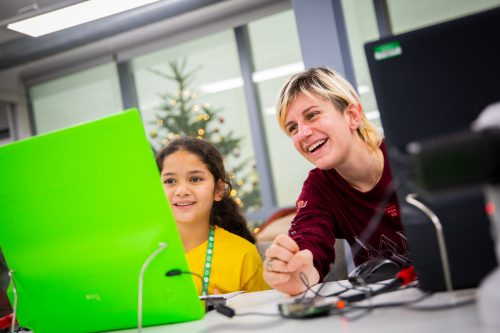
Female role models in UK media
In order to understand the extent of this imbalance, we carried out an analysis to explore the visibility of female technology role models in the UK media.
One of our most striking findings was that in the twelve months since International Women’s Day 2018, each of the women competing in UK television’s Love Island 2018 was written about in the UK media on average seven times more often than 50 of the UK’s top female technology role models. And popular UK men’s lifestyle magazines were twice as likely to write about top female technology leaders than magazines aimed at women.
We also looked at the subject matter covered by popular women’s and men’s magazines in the UK. We found that fashion (37% of all articles) and beauty (26%) were the most popular topics in women’s lifestyle media, while politics (5%) and careers (4%) were some of the least popular. The contrast with men’s lifestyle media was very pronounced. There, topic coverage was much more evenly distributed: fashion (21%) and politics (16%) came top, with grooming (12%) and careers (12%) close behind.
In other words, in the women’s lifestyle magazines, about 14 articles are written about fashion and beauty for every one about careers. Men’s lifestyle magazines, meanwhile, publish one careers piece for every three fashion and grooming articles.
Real role models in Code Club, CoderDojo, and beyond
It’s alarming to see such a dramatic imbalance in visibility for female technology leaders, and such stark differences between the focus of women’s and men’s media. We work hard to make sure our activities such as Code Club and CoderDojo are equally welcoming to girls and boys, and we’re proud that 45% of the volunteers and educators who run these clubs are women. However, role models in wider society are just as important in shaping the values, beliefs, and ambitions of girls and women.
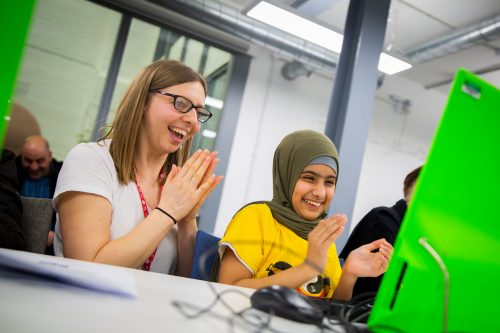
We have a consistently high proportion of girls – around 40% – attending our Code Clubs and CoderDojos. But girls’ perceptions of computing, and their confidence, can be influenced hugely before they ever arrive at our clubs to give it a try – so much so that they may never arrive at all.
In this context, the differences we observed between the topics that women’s and men’s media cover are troubling. It really comes down to balance: there is absolutely nothing wrong with reading about fashion or beauty, but greater diversity in the women, interests, and careers that saturate our popular culture would undoubtedly impact the gender imbalance that persists in sectors such as technology and science.

We are for everyone
When it comes to encouraging girls to take part in our digital skills activities, our approach is highly adaptable, but ultimately we are for everyone. We believe this inclusive approach is the most effective way of reinforcing that all genders are equally capable of enjoying and excelling at computing. It would be invaluable to see this reflected in popular culture.
This International Women’s Day, we’re encouraging women to consider the ways in which we are real role models. Join us to celebrate the #RealRoleModels who inspire you, and share the fantastic contributions of girls and women in technology.
The post Real role models for International Women’s Day 2019 appeared first on Raspberry Pi.


